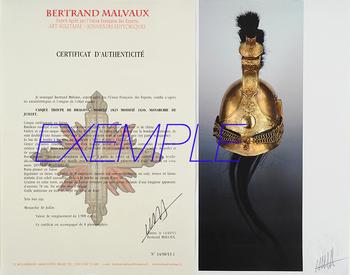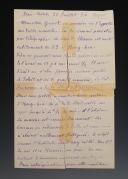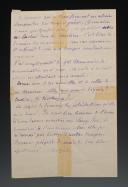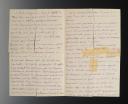
Tonkin Expedition. SIGNED AUTOGRAPH LETTER BY NÉGRIER (Oscar) ADDRESSED TO "MY DEAR GRISOT", Bac Ninh, July 30, 1884. 18999-12
Sold out
Tonkin Expedition. SIGNED AUTOGRAPH LETTER NÉGRIER (Oscar) ADDRESSED TO "MY DEAR GRISOT", Bac Ninh, July 30, 84. 18999-12
An interesting testimony from General Négrier addressed to "My dear Grisot" regarding the heat, clothing of soldiers, their health, and the military situation in Tonkin.
Bac-Ninh, July 30, 84.
"This letter will bring you sad news. You may already know it by telegraph. Captain Mason died suddenly on the 29th at Hon-hoa. Nothing could have led us to foresee his death, I had seen him a month and a half ago. He told me he had never been better.
The sun is the great enemy here. Colonel Duchesne may have mentioned this example to you: on a small reconnaissance around Hong-hop, the 4th of the 2nd regiment was resting until 4:30 in the afternoon, in the shade. The march was resumed slowly. The men in canvas clothing and without packs were not at all tired. The sun, as usual, was somewhat veiled. Around 6 o'clock in the evening, it clears up a bit. In an instant, 3 men are struck dead by lightning [...] Guihal, my orderly officer, almost died. He delirious for 15 days. He is unable to continue and is returning to France on sick leave. I believe Mason was sunstruck without realizing it [...] Remarkably, a large number of the men who die in hospitals have delusions of terror that recur in most of them. The doctors do not know this disease, they say [...]
We do not yet know what will happen. The ultimatum given to China expires on August 1st. I am convinced that above all, they fear this war. I would bet that this ultimatum will be extended and that our threats will end in nothing [...] This mountainous country is poor, very unhealthy. It will cost us dearly in men and money. Do what you can to send us a large quantity of clothing, shoes, canvas clothing, and camping equipment. At the moment, there is not a single pair of shoes left in the Tonkin stores. In Bac-Ninh alone, 196 infantry and artillerymen are barefoot [...]
He also inquires about the situation in Morocco "Are you going to take Figuig, Ouchda, Moulouya? [...]
Signed: Négrier".
Dimensions: 20.5 cm x 13 cm.
Double sheet, 4 pages of writing.
Writing in good condition (no missing text), tears repaired.
BIOGRAPHY:
Oscar de NÉGRIER, born on October 2, 1839 in Belfort and died on August 22, 1913 aboard the ship Kong Harald off the coast of Norway, was a French division general and military theorist, Grand Cross of the Legion of Honor and Military Medal recipient. He distinguished himself notably during the suppression of the insurrection in southern Oran (1881) in Algeria and during the Franco-Chinese War of 1884-1885. He then commanded several army corps, was army inspector, and a member of the Superior War Council from 1895 to 1899.
HISTORICAL BACKGROUND:
Bắc Ninh is a city in northern Vietnam, the capital of the Bắc Ninh province.
The capture of Hưng Hóa (April 12, 1884) was a major victory in the Tonkin campaign (1883–86).
The Tonkin expedition was a series of French military operations under the Third Republic between 1883 and 1886, carried out by the Tonkin Expeditionary Corps, to continue colonial expansion in Southeast Asia and put an end to Chinese attacks; it was part of the conflict with China.
Second expedition [...] Ferry's return in February 1883 rekindled colonial operations in the region, increasing the Tonkin Expeditionary Corps to four thousand then nine thousand men. In August 1883, the Hué court was forced to accept a protectorate treaty that imposed the presence of a French resident and dismembered the empire. The Protectorate of Tonkin was subjected to complete French occupation; the name of Annam, hitherto used in the West to name the entire country, would now only refer to the central province of Vietnam, also placed under a looser protectorate regime.
The new commander-in-chief of the expeditionary corps in February 1884, General Millot, organized his forces (10,000 men in 1884) into two brigades; the first under General Brière de l'Isle's command and the other under GENERAL DE NÉGRIER's.
Two campaigns, one in March-April which led to the conquest of BAC NINH and HUNG HOA, and the other in May-June for Thai Nguyen and Tuyen Quang. After the Bac Le ambush, General Millot requested his recall for September, describing himself as ill and disillusioned.
Admiral Courbet at the Hué court.
By the Tientsin Convention, China acknowledged the French conquests and promised to withdraw its troops from Tonkin. But an incident reignited the conflict, with Admiral Courbet resuming his campaign against the Chinese coasts. Partial peace only returned on June 9, 1885, with disturbances resuming in the Hué region until December 1885.
Despite the fall of the Ferry government caused by the evacuation of the Lạng Sơn border post on March 30, 1885, Tonkin policy continued, with the parliament continuing to vote the necessary credits despite a weaker majority, for the pacification of Tonkin, which was only truly effective in 1891 thanks to Gallieni's "oil spot" policy.
An interesting testimony from General Négrier addressed to "My dear Grisot" regarding the heat, clothing of soldiers, their health, and the military situation in Tonkin.
Bac-Ninh, July 30, 84.
"This letter will bring you sad news. You may already know it by telegraph. Captain Mason died suddenly on the 29th at Hon-hoa. Nothing could have led us to foresee his death, I had seen him a month and a half ago. He told me he had never been better.
The sun is the great enemy here. Colonel Duchesne may have mentioned this example to you: on a small reconnaissance around Hong-hop, the 4th of the 2nd regiment was resting until 4:30 in the afternoon, in the shade. The march was resumed slowly. The men in canvas clothing and without packs were not at all tired. The sun, as usual, was somewhat veiled. Around 6 o'clock in the evening, it clears up a bit. In an instant, 3 men are struck dead by lightning [...] Guihal, my orderly officer, almost died. He delirious for 15 days. He is unable to continue and is returning to France on sick leave. I believe Mason was sunstruck without realizing it [...] Remarkably, a large number of the men who die in hospitals have delusions of terror that recur in most of them. The doctors do not know this disease, they say [...]
We do not yet know what will happen. The ultimatum given to China expires on August 1st. I am convinced that above all, they fear this war. I would bet that this ultimatum will be extended and that our threats will end in nothing [...] This mountainous country is poor, very unhealthy. It will cost us dearly in men and money. Do what you can to send us a large quantity of clothing, shoes, canvas clothing, and camping equipment. At the moment, there is not a single pair of shoes left in the Tonkin stores. In Bac-Ninh alone, 196 infantry and artillerymen are barefoot [...]
He also inquires about the situation in Morocco "Are you going to take Figuig, Ouchda, Moulouya? [...]
Signed: Négrier".
Dimensions: 20.5 cm x 13 cm.
Double sheet, 4 pages of writing.
Writing in good condition (no missing text), tears repaired.
BIOGRAPHY:
Oscar de NÉGRIER, born on October 2, 1839 in Belfort and died on August 22, 1913 aboard the ship Kong Harald off the coast of Norway, was a French division general and military theorist, Grand Cross of the Legion of Honor and Military Medal recipient. He distinguished himself notably during the suppression of the insurrection in southern Oran (1881) in Algeria and during the Franco-Chinese War of 1884-1885. He then commanded several army corps, was army inspector, and a member of the Superior War Council from 1895 to 1899.
HISTORICAL BACKGROUND:
Bắc Ninh is a city in northern Vietnam, the capital of the Bắc Ninh province.
The capture of Hưng Hóa (April 12, 1884) was a major victory in the Tonkin campaign (1883–86).
The Tonkin expedition was a series of French military operations under the Third Republic between 1883 and 1886, carried out by the Tonkin Expeditionary Corps, to continue colonial expansion in Southeast Asia and put an end to Chinese attacks; it was part of the conflict with China.
Second expedition [...] Ferry's return in February 1883 rekindled colonial operations in the region, increasing the Tonkin Expeditionary Corps to four thousand then nine thousand men. In August 1883, the Hué court was forced to accept a protectorate treaty that imposed the presence of a French resident and dismembered the empire. The Protectorate of Tonkin was subjected to complete French occupation; the name of Annam, hitherto used in the West to name the entire country, would now only refer to the central province of Vietnam, also placed under a looser protectorate regime.
The new commander-in-chief of the expeditionary corps in February 1884, General Millot, organized his forces (10,000 men in 1884) into two brigades; the first under General Brière de l'Isle's command and the other under GENERAL DE NÉGRIER's.
Two campaigns, one in March-April which led to the conquest of BAC NINH and HUNG HOA, and the other in May-June for Thai Nguyen and Tuyen Quang. After the Bac Le ambush, General Millot requested his recall for September, describing himself as ill and disillusioned.
Admiral Courbet at the Hué court.
By the Tientsin Convention, China acknowledged the French conquests and promised to withdraw its troops from Tonkin. But an incident reignited the conflict, with Admiral Courbet resuming his campaign against the Chinese coasts. Partial peace only returned on June 9, 1885, with disturbances resuming in the Hué region until December 1885.
Despite the fall of the Ferry government caused by the evacuation of the Lạng Sơn border post on March 30, 1885, Tonkin policy continued, with the parliament continuing to vote the necessary credits despite a weaker majority, for the pacification of Tonkin, which was only truly effective in 1891 thanks to Gallieni's "oil spot" policy.
Reference :
18999-12

Next update Friday, april 4th at 1:30 PM
FOR ALL PURCHASES, PAYMENT IN MULTIPLE CHECKS POSSIBLE
bertrand.malvaux@wanadoo.fr 06 07 75 74 63
An authenticity certificate of the item including the description published on the site, the period, the sale price, accompanied by one or more color photographs is automatically provided for any item priced over 130 euros. Below this price, each certificate is charged 5 euros.
Only items sold by me are subject to an authenticity certificate, I do not provide any expert reports for items sold by third parties (colleagues or collectors).


